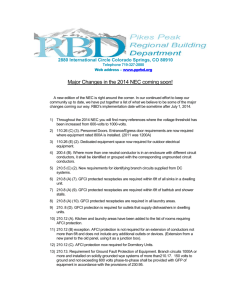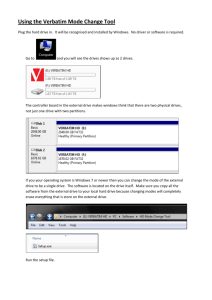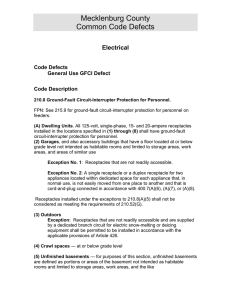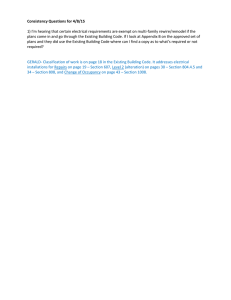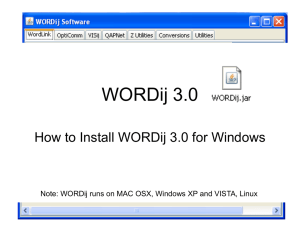CONSISTENCY MEETING DEPARTMENTAL GOALS: SAFETY ISSUES:
advertisement
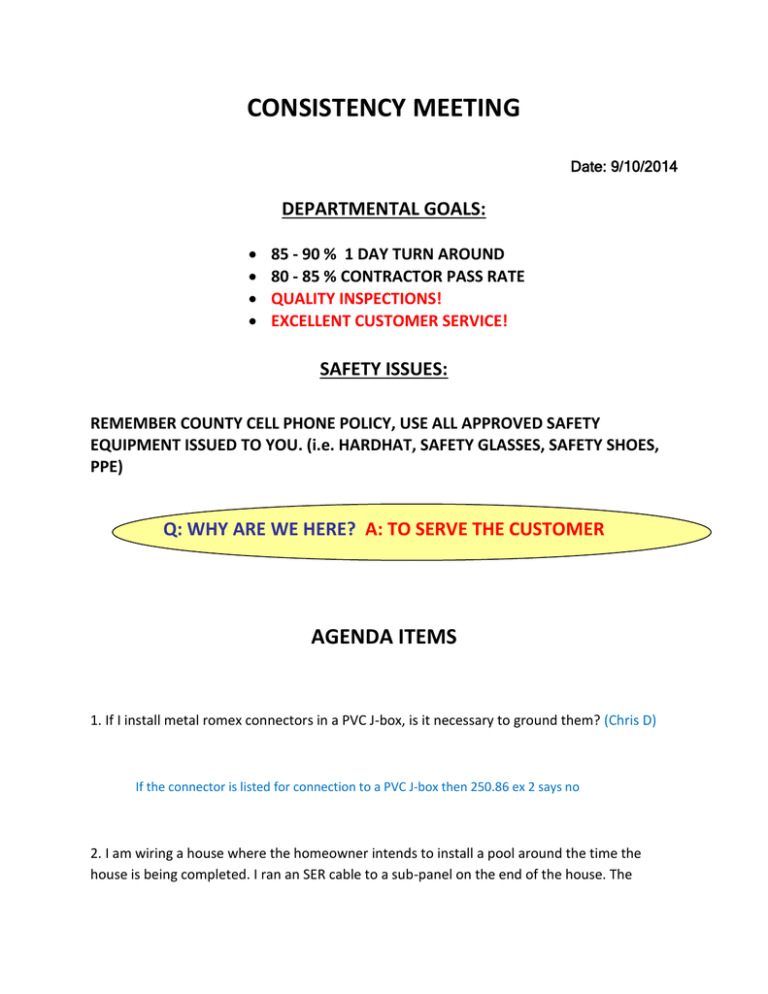
CONSISTENCY MEETING Date: 9/10/2014 DEPARTMENTAL GOALS: 85 - 90 % 1 DAY TURN AROUND 80 - 85 % CONTRACTOR PASS RATE QUALITY INSPECTIONS! EXCELLENT CUSTOMER SERVICE! SAFETY ISSUES: REMEMBER COUNTY CELL PHONE POLICY, USE ALL APPROVED SAFETY EQUIPMENT ISSUED TO YOU. (i.e. HARDHAT, SAFETY GLASSES, SAFETY SHOES, PPE) Q: WHY ARE WE HERE? A: TO SERVE THE CUSTOMER AGENDA ITEMS 1. If I install metal romex connectors in a PVC J-box, is it necessary to ground them? (Chris D) If the connector is listed for connection to a PVC J-box then 250.86 ex 2 says no 2. I am wiring a house where the homeowner intends to install a pool around the time the house is being completed. I ran an SER cable to a sub-panel on the end of the house. The inspector informed me that I could not use the panel for the pool because it doesn’t have an insulated ground wire. Does this panel not meet the exception for ‘existing feeder’ since it was installed before the pool was constructed? (Matt K) Because the homeowner tells us that it’s intended for a pool then we need to get the proper wiring method installed. If we didn’t know it was for a pool and the CO had been issued, then technically it would fall under the “existing feeder” category. It is also very unwise to gamble with someone’s safety this way. 3. Are in-use covers required on SS’s? If so, do they have to be extra duty? (Craig S) Yes, and Yes; start at 590.4(D)(2) then to 406.9(B) then 314.23 (B) Wet Locations. (1) 15- and 20-Ampere Receptacles in a Wet Location. 15- and 20-ampere, 125- and 250-volt receptacles installed in a wet location shall have an enclosure that is weatherproof whether or not the attachment plug cap is inserted. For other than one- or two-family dwellings, an outlet box hood installed for this purpose shall be listed, and where installed on an enclosure supported from grade as described in 314.23(B) or as described in 314.23(F) shall be identified as “extra-duty.” All 15- and 20-ampere, 125- and 250volt nonlocking-type receptacles shall be listed weather-resistant type. Exception: 15- and 20-ampere, 125- through 250-volt receptacles installed in a wet location and subject to Routine high-pressure spray washing shall be permitted to have an enclosure that is weatherproof when the attachment plug is removed. (2) Other Receptacles. All other receptacles installed in a wet location shall comply with (B)(2)(a) or (B)(2)(b). (a) A receptacle installed in a wet location, where the product intended to be plugged into it is not attended while in use, shall have an enclosure that is weatherproof with the attachment plug cap inserted or removed. (b) A receptacle installed in a wet location where the product intended to be plugged into it will be Attended while in use (e.g., portable tools) shall have an enclosure that is weatherproof when the attachment plug is removed. 4. Let's discuss W8 code; defect by others; and inaccessible; charge to GC or EC. (Matt K) A W8 code is to be used Only if this is the Only thing wrong .Example #1 Framers tear out the wiring to add studs. This is a W8. Example #2 Framers tear out the wiring to add studs, receptacle spacing in living room, and need stud guards. This wouldn't be a W8. (You would put the necessary codes in the defects and not use the W8) Also the W8 code doesn't go against the E/C unless it’s a standalone permit. First all the 03 Inaccessible code is to be used during the hours of 8-5. Example #1, Once you auto notify and you’re in route, Someone calls and want to cancel because no one can be there to unlock. This is a 03 code. Example #2 I have an apartment building with multiple requests. I auto notify all of them. When I arrive I can't get in them due to floors wet. You can then select one of the request and 03, Put in the remarks that All of them were 03 codes, and then you can cancel the other request. 5. Is HDPE approved to be used as a raceway for a directional boring installation? (Joe W) Per UL and the manufacturer continuous length HDPE is now approved for directional boring and for a raceway. PVC has to be marked 6. Can I use existing conduits installed under roof decking that are within 1-1/2” of the decking without relocating them? I have to pull more wires in them, but I don’t intend on moving or altering them in any way. (Joe W) By adding new conductors to the system, (altering), where new conductors are installed that portion is required to meet current code. 7. I am installing an LED sign. The driver/transformer is located in the soffit behind the sign. The driver enclosure has a built in disconnect, but there is no disconnect at the sign itself. Is this a violation? (John W) 600.6(A) says this is a violation 600.6 Disconnects. Each sign and outline lighting system, feeder circuit or branch circuit supplying a sign, outline lighting system, or skeleton tubing shall be controlled by an externally operable switch or circuit breaker that opens all ungrounded conductors and controls no other load. The switch or circuit breaker shall open all ungrounded conductors simultaneously on multi-wire branch circuits in accordance with 210.4(B). Signs and outline lighting systems located within fountains shall have the disconnect located in accordance with 680.12. Exception No. 1: A disconnecting means shall not be required for an exit directional sign located within a building. Exception No. 2: A disconnecting means shall not be required for cord-connected signs with an attachment plug. (A) Location. (1) Within Sight of the Sign. The disconnecting means shall be within sight of the sign or outline lighting system that it controls. Where the disconnecting means is out of the line of sight from any section that is able to be energized, the disconnecting means shall be capable of being locked in the open position. The provision for locking or adding a lock to the disconnecting means must remain in place at the switch or circuit breaker whether the lock is installed or not. Portable means for adding a lock to the switch or circuit breaker shall not be permitted. (2) Within Sight of the Controller. The following shall apply for signs or outline lighting systems operated by electronic or electromechanical controllers located external to the sign or outline lighting system: (1) The disconnecting means shall be permitted to be located within sight of the controller or in the same enclosure with the controller. (2) The disconnecting means shall disconnect the sign or outline lighting system and the controller from all ungrounded supply conductors. (3) The disconnecting means shall be designed such that no pole can be operated independently and shall be capable of being locked in the open position. The provisions for locking or adding a lock to the disconnecting means must remain in place at the switch or circuit breaker whether the lock is installed or not. Portable means for adding a lock to the switch or circuit breaker shall not be permitted. 8. Is a low voltage permit required to run a thermostat wire for an HVAC system? (Chris D) We have electrical permits that we issue for electrical work whether it’s high, medium, low or any other voltage. When the Mechanical contractor has electrical license this wiring falls under that permit. Above classified areas. 9. Are extra duty receptacle covers required for outdoor receptacles at apartment buildings? (Craig S) Where not on decks, balconies, or porches of individual apartment or condo units, and used in service or common areas an extra duty cover is required 406.9(B)(1) (B) Wet Locations. (1) 15- and 20-Ampere Receptacles in a Wet Location. 15- and 20-ampere, 125- and 250-volt receptacles installed in a wet location shall have an enclosure that is weatherproof whether or not the attachment plug cap is inserted. For other than one- or two-family dwellings, an outlet box hood installed for this purpose shall be listed, and where installed on an enclosure supported from grade as described in 314.23(B) or as described in 314.23(F) shall be identified as “extra-duty.” All 15- and 20-ampere, 125- and 250-volt nonlocking-type receptacles shall be listed weather-resistant type. 10. If panic hardware is required does it have to be installed at the T/P request? (Matt K) Yes, 110.26(C)(3) and NC Electrical Admin code. 11. I'm running Cat 5 cable through PVC and routing the 120v power in another PVC. The PVC was cut. I'm going to set a quazite box over these PVC's. Do I need to separate these two different wiring methods and if so what would be an approved method to do this? (Gerald B) There must be a non-conductive barrier between Cat 5 and 120V power. NEC 800.47(A) 12. The question has been asked, do we accept a public utility gas system (PNG) as the sole fuel supply for a NEC 700 or 701 generator? (John W) No unless they are considered a reliable source. 700.12(B). Per County Atty we may consider PNG a reliable source 13. Where you have a direct connection (TAP) from a generator feeding a fire pump, do you size the conductors per NEC 445.13 @115% of the nameplate current rating of the generator? Or per NEC 695.6(B) @125% of the fire pump motor? (Joe W) It depends on where your overcurrent protection is located 445.13, 695.6(B)(1) & (2) 445.13 Ampacity of Conductors. The ampacity of the conductors from the generator terminals to the first distribution device(s) containing overcurrent protection shall not be less than 115 percent of the nameplate current rating of the generator. It shall be permitted to size the neutral conductors in accordance with 220.61. Conductors that must carry ground-fault currents shall not be smaller than required by 250.30(A). Neutral conductors of dc generators that must carry ground-fault currents shall not be smaller than the minimum required size of the largest conductor. Exception: Where the design and operation of the generator prevent overloading, the ampacity of the conductors shall not be less than 100 percent of the nameplate current rating of the generator. 14. I have a large multi-tenant building with overhead service drops to each tenant space with a weather head, riser and a meter on outside, through the wall to a main panel on the inside of each suite. The landlord wants to divide one of the tenant spaces into two spaces by adding a demising wall between the two spaces leaving one without power. The engineer has purposed installing a Main panel inside the vacant space, through the wall to a meter on the outside, with a riser up to the weather head. This is the same scenario as the other tenant spaces have. Would this be code compliant? Maybe. We start with 230.2 to see how many services are allowed on the building and also look to see if this project is creating a new service. If this project doesn’t create a new service we don’t have a problem. If it does create a new service it will have to be justified according to 230.2. 15. I have a dilemma on an apartment project using split systems for HVAC. I have asked for several months how they are protecting the conductors feeding the interior fans (rated at .2 amps at 208 volts) using the branch circuit OCD. Now, as you may have already guessed, this is holding up CO. The units have 1 outside controller with a minimum circuit ampacity of 18 amps and a max fuse size of 20 amps, and the tap conductors are 14 UF cable and some could be up to 100' in length or more. Thanks for any assistance you can provide. (David R) 16. Can you please add to the agenda. 410.2 Definition The volume bounded by the sides and back closet walls and planes extending from the closet floor vertically to a height of 1.8 m (6 ft) or to the highest clothes-hanging rod and parallel to the walls at a horizontal distance of 600 mm (24 in.) from the sides and back of the closet walls, respectively, and continuing vertically to thecloset ceiling parallel to the walls at a horizontal distance of 300 mm (12 in.) or the width of the shelf, whichever is greater; for a closet that permits access to both sides of a hanging rod, this space includes the volume below the highest rod extending 300 mm (12 in.) on either side of the rod on a plane horizontal to the floor extending the entire length of the rod. See Figure 410.2. This section doesn't mention the front wall. We are having issues with Inspectors defining "Closet storage space". 410.16 (C) (1) States the minimum clearance for an incandescent fixture installed on the wall above the door or on the ceiling. I have been told by several inspectors that Gerald Barnes has a picture of a closet where a homeowner installed a shelf above the door after the Homeowner moved in. In result of this picture, our inspections have been failing due to light clearance off the front wall. Please see attached picture. I've been told that a 24" florescent style fixture mounted on wall, centered over top of door, (per the attached drawling) is also unacceptable. (Gerald B) NEXT MEETING: Contractors – Wednesday November 12, 2014 Inspectors – Wednesday October 8, 2014
